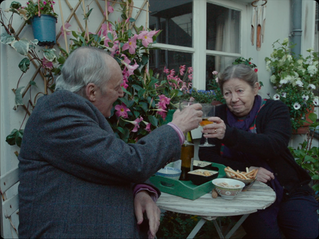Disintegration Loop 1.1
- Jonny Rogers
- Feb 3, 2022
- 3 min read
William Basinski, 2001

Throughout the 1980s, William Basinski produced a number of experimental compositions using tape loops, found sounds and shortwave radio static. Although he worked with a number of bands and musicians – even opening for David Bowie on one occasion – Basinski’s work would not receive significant recognition until the new millennium.
In the process of transferring his magnetic tapes to a digital format, he discovered that his old recordings were beginning to disintegrate; as the tape head scratched and peeled back the layer of ferrite, Basinski was, in fact, recording the entropy of the sounds he had produced decades earlier. The result, Disintegration Loops I-IV are equal parts beautiful, melancholic and haunting; creating an experience which, in absence of any appropriate descriptors, one must only listen for themselves.
With great poetic consonance, the first part of this project was finished on the morning of September 11, 2001. That evening, as Basinski watched the aftermath of unspeakable terror from the roof of his Brooklyn apartment, he set up a video camera and began to record the daylight fading over a nation in turmoil.
This encounter with humanity’s own capacity for destruction – an act of violence that destabilised, for many, the illusion of Western impermeability – aroused, in countless artists and filmmakers, an ethically-enthused aesthetic impulse; a yearning to capture a feeling that one presently stood at the precipice of modern history, deeply uncertain of what tomorrow will bring.
Unlike most 9/11 films, however, Disintegration Loop 1.1 doesn’t try to rationalise or explain the phenomena it witnesses. Instead, Basinski sets the camera up just to dwell on the hazy horizon; silent and still, as if paralysed – or else subdued – by grief.
There is little to say of any directorial style or skill, at least as far as the film is concerned. For all its due merit, the recording does not serve to establish Basinski as an underrated cinematic auteur – but that is not, I believe, his intention. Rather, the value of this audiovisual composition lies in its ability to create an idiosyncratic zone of reflection, meditation, and lament; a place where one can, for lack of a better expression, draw closer to oneself.
For anyone who should venture into the unchartered waters of internet forums and YouTube comments, you will likely find, in any discussion concerning this work, a set of deeply introspective and often lyrical accounts of grief, remorse, regret, and the lingering impression of ephemeral encounters; as if the melancholic beauty of the composition pulls the soul toward redemption through public confession.
I have listened to and watched the series too many times to count, yet despite their inherently repetitive structure, they have never felt all that predictable or tedious. While the alterations between each successive iteration of the five to ten-second loops are more or less negligible, the compositions undergo a slow, but significant metamorphosis – even if such can only be observed upon returning to the start. After all, life, as Kierkegaard said, can only be understood backwards.
The virtue of the recording, however, lies not solely in its historical actuality; as the daylight softly fades behind the endless tower of smoke, we are reminded that the order of nature is unchanged by human grief. Perhaps, however, we might discover here a glimpse of consolation: just as the sun once fell over the burning ruins of countless other cities – Ancient, Medieval, and modern – so too will the sun assuredly rise over a new world.
A brief poetic epitaph anticipates what such a world might look like:
In loving memory
of those who died
as a result of the atrocities
of September 11th, 2001.
Their lives had great meaning
for all who loved them
and we embrace that meaning
and that love
as inspiration and hope
for a new world
built on love and creativity.
Basinski believes that the people of tomorrow will be all the richer for having learned to grieve for what they once believed was permanent; for embracing melancholy not just as a prelude to despair but also as an impetus for love.








Comments